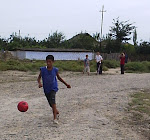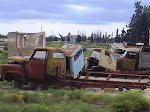3/10
He tosses a wheely to harness my attention. “Salam Sasha Muellim!” My fifth-form student’s round dark cheeks are illuminated in the sun, which has been burning like this for three weeks. There’s been a cool breeze off the Caspian with sun that’s taken a trip from Santa Barbara to my village.
“Salam Rasim! How are you?” I expect diligent students like Rasim, six months into classroom time with a native English teacher, to store useful phrases like “how are you?” in their little noggins. But Rasim looks to the ground. I repeat the greeting in Azerbaijani: “Necesen, Rasim?”
“Yaxshiyem Sasha!”
“Good, Rasim. O ‘good’ dir.”
“Good,” he whispers, practicing to the air. He nods, popping his front tire as if avoiding a passing turtle in the road.
Though the weather is still cool there are bursts of light and with it that summer smell, which reeks of nearby garbage.
Girls pass, still dressed from school with their white collared button-downs, pleated black skirts and bunched scrunchies that hold common braids. We wave, with giggles from both sides.
Rounding the corner, passed the Internet café without online access (though the place carries several versions of Auto Theft), I wave to the storeowner whose warmth pervades him. “Netirsen, Sasha?” Like most Azeri men he wears his thigh-length black leather coat, black slacks and shined shoes in an environment in California that would be saved for tattered Levi’s and a t-shirt.
“Yaxshiyem.”
“Netirsuz?” I try, still finagling with the suffix for my elders.
“Yaxshiyem.”
I kick the gravel rock, torn up from the broken road that was paved less than a year ago. The storeowner ahead has bragged to the whole village that I buy credit for my cell phone from him exclusively. “Hello, Sasha,” he says with less confidence than he should. I wave to him and the chatting men, who after all these months maintain a look of confusion when I pass. They are all dressed alike.
There is at least 15 feet before I hit three more convenient stores and the brick skeleton of the early 20th-century bazaar. White grocery bags dangle from leafless branches posed over the building. The bags almost reveal the splendor seen in American Beauty; but this here is real life. They are a distraction from the way winter can mend the earth.
I run my hand along the rusted gas pipe free to whatever a 14-year-old boy might do to it, and notice a woman in the street flailing her arms, as if warning me of an oncoming car.
“Sasha mextub var!” The post lady announces to the neighborhood that is a letter for me in the tiny, pink, hexagonal building facing the road. All village post offices are like this, the shape and size endears at first, though it quickly becomes another square structure. The post lady’s hair is pulled up in a gold and black clip and her chubby old cheeks rise above her crooked chin. Though my Azeri has improved exponentially in past months and all my packages come from America, she speaks to me in Russian. “I don’t know Russian,” I say in Azerbaijani. I cross my fingers that it’s from Eric, though she pulls out the bi-weekly mailer: an update from the office of staff comings and goings, a note from the country director, and two Newsweek magazines to keep me moderately informed about American politics and entertainment.
With a lofty “salamat!,” the formal goodbye, I step out into the world whose color, with the exception of the spring sky and the rose post office, is perpetually dull. Into this fading winter, hues of brown layer the earth: dirt, clay brick, exhaust from white Ladas and dried, tired branches. On my way to anywhere, though this day on my way to Baku, I walk down this same semi-paved road in this syndrome of plain. There are few moments I don’t realize this, and what it does to my soul is only thwarted by salams.
Sunday, March 16, 2008
Subscribe to:
Comments (Atom)

















































